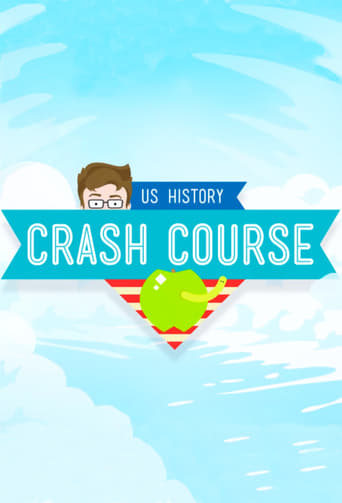

John Green teaches you the history of the United States of America in 47 episodes!
 AD
AD
All Prime Video
Cancel anytime


In which John Green teaches you about recent history. By which we mean VERY recent history. John covers the end of George W. Bush's administration presidency of Barack Obama (so far). Some people would say, "It's too soon to try to interpret the historical importance of such recent events!" To those people, we answer, "You're right." Nonetheless, it's worthwhile to take a look at the America we live in right now as a way of looking back at how far we've come. Anyway, John will teach you about Obama's election, some of his policies like the Affordable Care Act, the 2009 stimulus, and the continuation of the war on terror. If you still can't reconcile a history course teaching such recent stuff, just think of this one as a current events episode.

In which John Green teaches you about the tumultuous 2000s in the United States of America, mainly the 2000s that coincide with the presidency of George W Bush. From the controversial election in 2000 to the events of 9/11 and Bush's prosecution of the War on Terror, the George W. Bush presidency was an eventful one. John will teach you about Bush's domestic policies like tax-cutting and education reform, and he'll get into the wars in Afghanistan and Iraq. The event that came to pass during Bush's presidency are still very much affecting the United States and the world today, so listen up!

In which John Green teaches you about the United States as it was in the 1990s.

In which John Green teaches you about the end of the Cold War and the presidency of George H.W. Bush.

In which John Green teaches you about what is often called the Reagan Era. Mainly, it covers the eight years during which a former actor who had also been governor of the state of California was president of the United States. John will teach you about Reagan's election victory over the hapless Jimmy Carter, tax cuts, Reagan's Economic Bill of Rights, union-busting, and the Iran-Contra among other things. Learn about Reagan's domestic and foreign policy initiatives, and even a little about Bonzo the Chimp.

In which John Green teaches you about the economic malaise that beset the United States in the 1970s. A sort of perfect storm of events, it combined the continuing decline of America's manufacturing base and the oil shocks of 1973 and 1979, and brought about an stagnant economy, paired with high inflation. Economists with a flair for neologisms and portamenteau words called this "stagflation," and it made people miserable. Two presidential administrations were scuttled at least in part by these economic woes; both Gerald Ford and Jimmy Carter are considered failed presidents for many reasons, but largely because of an inability to improve the economy. (hint: In reality, no one person can materially change something as big as the world economy, even if they are president, but one person sure can make a handy scapegoat!) So, by and large, the 70s were a pretty terrible time in America economically, but at least the decade gave us Mr. Green.

In which John Green teaches you about the rise of the conservative movement in United States politics.

In which John Green teaches you about a time of relative tumult in the United States, the 1960s. America was changing rapidly in the 1960s, and rights movements were at the forefront of those changes. Civil Rights were dominant, but the 60s also saw growth in the Women's Movement, the LGBT Rights Movement, the Latino Rights Movement, and the American Indian Movement. Also, Americans began to pay a bit more attention to the environment. All this change happened against the backdrop of the Cold War and the Rise of Conservatism. It was just wild. John will teach you about sit-ins, Freedom Rides, The March on Washington, MLK, JFK, LBJ, and NOW. Man, that is a lot of initialisms. And one acronym.

In which John Green teaches you about the early days of the Civil Rights movement. By way of providing context for this, John also talks a bit about wider America in the 1950s.

In which John Green teaches you about the Cold War as it unfolded in Asia. As John pointed out last week, the Cold War was occasionally hot, and a lot of that heat was generated in Asia. This is starting to sound weird with the hot/cold thing, so let's just say that the United States' struggle against communist expansion escalated to a full-blown, boots-on-the-ground war in Korea and Vietnam. In both of these cases, the United States sent soldiers to intervene in civil wars that it looked like communists might win. That's a bit of a simplification, but John will explain it all to you.

In which John Green teaches you about the Cold War, the decades-long conflict between the USA and the USSR. The Cold War was called cold because of the lack of actual fighting, but this is inaccurate. There was plenty of fighting, from Korea to Viet Nam to Afghanistan, but we'll get into that stuff next week. This week we'll talk about how the Cold War started. In short, it grew out of World War II. Basically, the Soviets occupied Eastern Europe and the US-supported western Europe. This setup would spill across the world, with client states on both sides. It's all in the video. You should just watch it.

In which John Green teaches you about World War 2, as it was lived on the home front. You'll learn about how the war changed the country as a whole, and changed how Americans thought about their country. John talks about the government's control of war production, and how the war probably helped to end the Great Depression. Broader implementation of the income tax, the growth of large corporations, and the development of the West Coast as a manufacturing center were also results of the war. The war positively changed the roles of women and African Americans, but it was pretty terrible for the Japanese Americans who were interred in camps. In short, World War II changed America's role in the world, changed American life at home, and eventually spawned the History Channel.
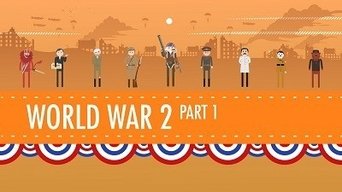
In which John Green teaches you about World War II, a subject so big, it takes up two episodes. This week, John will teach you how the United States got into the war, and just how involved America was before Congress actually declared war. John will actually talk a little about the military tactics involved, and he'll get into some of the weaponry involved, specifically the huge amount of aerial bombing that characterized the war, and the atomic bombs that ended the war in the Pacific.
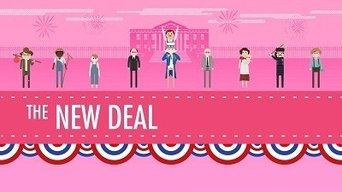
In which John Green teaches you about the New Deal, which was president Franklin D. Roosevelt's plan to pull the United States out of the Great Depression of the 1930s. Did it work? Maybe. John will teach you about some of the most effective and some of the best-known programs of the New Deal. They weren't always the same thing. John will tell you who supported the New Deal, and who opposed it. He'll also get into how the New Deal changed the relationship between the government and citizens, and will even reveal just how the Depression ended. (hint: it was war spending)
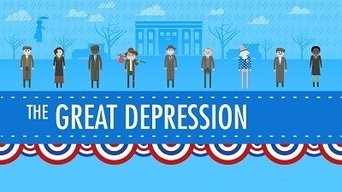
In which John Green teaches you about the Great Depression. So, everybody knows that the Great Depression started with the stock market crash in 1929, right? Not exactly. The Depression happened after the stock market crash, but wasn't caused by the crash. John will teach you about how the depression started, what Herbert Hoover tried to do to fix it, and why those efforts failed.
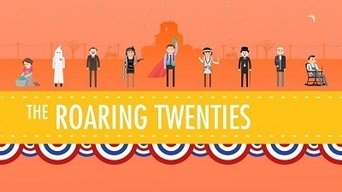
In which John Green teaches you about the United States in the 1920s. They were known as the roaring 20s, but not because there were lions running around everywhere. In the 1920s, America's economy was booming, and all kinds of social changes were in progress. Hollywood, flappers, jazz, there was all kinds of stuff going on in the 20s. But as usual with Crash Course, things were about to take a turn for the worse. John will teach you about the Charleston, the many Republican presidents of the 1920s, laissez-faire capitalism, jazz, consumer credit, the resurgent Klan, and all kinds of other stuff.

In which John Green teaches you about American women in the Progressive Era and, well, the progress they made. So the big deal is, of course, the right to vote women gained when the 19th amendment was passed and ratified. But women made a lot of other gains in the 30 years between 1890 and 1920. More women joined the workforce, they acquired lots of other legal rights related to property, and they also became key consumers in the industrial economy. Women also continued to play a vital role in reform movements. Sadly, they got Prohibition enacted in the US, but they did a lot of good stuff, too. The field of social work emerged as women like Jane Addams created settlement houses to assist immigrants in their integration into the United States. Women also began to work to make birth control widely available. You'll learn about famous reformers and activists like Alice Paul, Margaret Sanger, and Emma Goldman, among others.

In which John Green teaches you about American involvement in World War I, which at the time was called the Great War. They didn't know there was going to be a second one, though they probably should have guessed, 'cause this one didn't wrap up very neatly. So, the United States stayed out of World War I at first, because Americans were in an isolationist mood in the early 20th century. That didn't last though, as the affronts piled up and drew the US into the war. Spoiler alert: the Lusitania was sunk two years before we joined the war, so that wasn't the sole cause for our jumping in. It was part of it though, as was the Zimmerman telegram, unrestricted submarine warfare, and our affinity for the Brits. You'll learn the war's effects on the home front, some of Woodrow Wilson's XIV Points, and just how the war ended up expanding the power of the government in Americans' lives.

In which John Green teaches you about the Progressive Presidents, who are not a super-group of former presidents who create complicated, symphonic, rock soundscapes that transport you into a fantasy fugue state. Although that would be awesome. The presidents most associated with the Progressive Era are Theodore Roosevelt, William Taft, and Woodrow Wilson. During the times these guys held office, trusts were busted, national parks were founded, social programs were enacted, and tariffs were lowered. It wasn't all positive though, as their collective tenure also saw Latin America invaded A LOT, a split in the Republican party that resulted in a Bull Moose, all kinds of other international intervention, and the end of the Progressive Era saw the United States involved in World War. If all this isn't enough to entice, I will point out that two people get shot in this video. Violence sells, they say.

In which John Green teaches you about Imperialism. In the late 19th century, the great powers of Europe were running around the world obtaining colonial possessions, especially in Africa and Asia. The United States, which as a young country was especially susceptible to peer pressure, followed along and snapped up some colonies of its own. The US saw that Spain's hold on its empire was weak, and like some kind of expansionist predator, it jumped into the Cuban War for Independence and turned it into the Spanish-Cuban-Phillipino-American War, which usually just gets called the Spanish-American War. John will tell you how America turned this war into colonial possessions like Puerto Rico, The Philippines, and almost even got to keep Cuba. The US was busy in the Pacific as well, wresting control of Hawaii from the Hawaiians. All this and more in a globe-trotting, oppressing episode of Crash Course US History.

In which John Green teaches you about the Progressive Era in the United States.
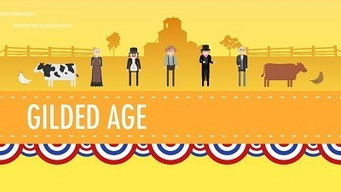
In which John Green teaches you about the Gilded Age and its politics.

In which John Green teaches you about the massive immigration to the United States during the late 19th and early 20th centuries.

In which John Green teaches you about the Wild, Wild, West, which as it turns out, wasn't as wild as it seemed in the movies. When we think of the western expansion of the United States in the 19th century, we're conditioned to imagine the loner. The self-reliant, unattached cowpoke roaming the prairie in search of wandering calves, or the half-addled prospector who has broken from reality thanks to the solitude of his single-minded quest for gold dust. While there may be a grain of truth to these classic Hollywood stereotypes, it isn't a very big grain of truth. Many of the pioneers who settled the west were family groups. Many were immigrants. Many were major corporations. The big losers in the westward migration were Native Americans, who were killed or moved onto reservations. Not cool, American pioneers.

In which John Green teaches you about the Industrial Economy that arose in the United States after the Civil War. You know how when you're studying history, and you're reading along and everything seems safely in the past, and then BOOM you think, "Man, this suddenly seems very modern." For me, that moment in US History is the post-Reconstruction expansion of industrialism in America. After the Civil War, many of the changes in technology and ideas gave rise to this new industrialism. You'll learn about the rise of Captains of Industry (or Robber Barons) like Cornelius Vanderbilt, Andrew Carnegie, John D Rockefeller, and JP Morgan. You'll learn about trusts, combinations, and how the government responded to these new business practices. All this, plus John will cover how workers reacted to the changes in society and the early days of the labor movement. You'll learn about the Knights of Labor and Terence Powderly, as well as Samuel Gompers and the AFL.

In which John Green teaches you about Reconstruction. After the divisive, destructive Civil War, Abraham Lincoln had a plan to reconcile the country and make it whole again. Then he was shot, Andrew Johnson took over, and the disagreements between Johnson and Congress ensured that Reconstruction would fail. The election of 1876 made the whole thing even more of a mess, and the country called it off, leaving the nation still very divided. John will talk about the gains made by African-Americans in the years after the Civil War, and how they lost those gains almost immediately when Reconstruction stopped. You'll learn about the Freedman's Bureau, the 14th and 15th amendments, and the disastrous election of 1876. John will explore the goals of Reconstruction, the successes and ultimate failures, and why his alma mater Kenyon College is better than Raoul's alma mater NYU.

In which John Green teaches you how the Civil War played a large part in making the United States the country that it is today. He covers some of the key ways in which Abraham Lincoln influenced the outcome of the war, and how the lack of foreign intervention also helped the Union win the war. John also covers the technology that made the Civil War different than previous wars. New weapons helped to influence the outcomes of battles, but photography influenced how the public at large perceived the war. In addition, John gets into the long-term effects of the war, including the federalization and unification of the United States. All this plus homesteading, land grant universities, railroads, federal currency, and taxes.
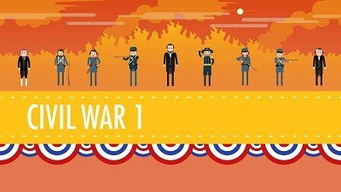
In which John Green ACTUALLY teaches about the Civil War. In part one of our two-part look at the US Civil War, John looks into the causes of the war, and the motivations of the individuals who went to war. The overarching causes and the individual motivations were not always the same, you see. John also looks into why the North won, and whether that outcome was inevitable. The North's industrial and population advantages are examined, as are the problems of the Confederacy, including its need to build a nation at the same time it was fighting a war. As usual, John doesn't get much into the actual battle-by-battle breakdown. He does talk a little about the overarching strategy that won the war, and Grant's plan to just overwhelm the South with numbers. Grant took a lot of losses in the latter days of the war, but in the end, it did lead to the surrender of the South.
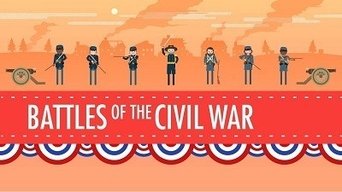
In which John Green lists a whole lot of the battles of the US Civil War in seven and a half minutes. We get a lot of requests for military history, so we offer a list of battle names, with some commentary about outcomes, and lots of really interesting pictures. This is a bit of a departure for Crash Course as we leave behind the world of thoughtful analysis and just list some facts. Don't worry though. We've already got our brains turned back on for the next episode.

In which John Green teaches you about the election of 1860. As you may remember from last week, things were not great at this time in US history. The tensions between the North and South were rising, ultimately due to the single issue of slavery. The North wanted to abolish slavery, and the South wanted to continue with it. It seemed like a war was inevitable, and it turns out that it was. But first, the nation had to get through this election. You'll learn how the bloodshed in Kansas and the truly awful Kansas-Nebraska Act led directly to the decrease in popularity of Stephen Douglas, the splitting of the Democratic party, and the unlikely victory of a relatively inexperienced politician from Illinois, Abraham Lincoln. Lincoln's election would lead directly to the secession of several southern states, and thus to the Civil War. John will teach you about all this, plus Dred Scott, Roger Taney, and John Brown.

In which John Green teaches you about the Mexican-American War in the late 1840s and the expansion of the United States into the western end of North America. In this episode of Crash Course, US territory finally reaches from the Atlantic coast to the Pacific Ocean. After Oregon was secured from the UK and the southwest was ceded by Mexico, that is. Famous Americans abound in this episode, including James K Polk (Young Hickory, Napoleon of the Stump), Martin Van Buren, Zachary Taylor, and Winfield Scott. You'll also learn about the California Gold Rush of 1848, and California's admission as a state, which necessitated the Compromise of 1850. Once more slavery is a crucial issue. Something is going to have to be done about slavery, I think. Maybe it will come to a head next week.

In which John Green finally gets around to talking about some women's history. In the 19th Century, the United States was changing rapidly, as we noted in the recent Market Revolution and Reform Movements episodes. Things were also in a state of flux for women. The reform movements, which were in large part driven by women, gave these self-same women the idea that they could work on their own behalf, and radically improve the state of their own lives. So, while these women were working on prison reform, education reform, and abolition, they also started talking about equal rights, universal suffrage, temperance, and fair pay. Women like Susan B. Anthony, Carry Nation, Elizabeth Cady Stanton, the Grimkés, and Lucretia Mott strove tirelessly to improve the lot of American women, and it worked, eventually. John will teach you about the Christian Temperance Union, the Seneca Falls Convention, the Declaration of Sentiments, and a whole bunch of other stuff that made life better for women.

In which John Green teaches you about various reform movements in the 19th century United States. From Utopian societies to the Second Great Awakening to the Abolition movement, American society was undergoing great changes in the first half of the 19th century. Attempts at idealized societies popped up (and universally failed) at Utopia, OH, New Harmony, IN, Modern Times, NY, and many other places around the country. These utopians had a problem with mainstream society, and their answer was to withdraw into their own little worlds. Others didn't like the society they saw and decided to try to change it. Relatively new Protestant denominations like the Methodists and Baptists reached out to "the unchurched" during the Second Great Awakening, and membership in evangelical sects of Christianity rose quickly. At the same time, Abolitionist societies were trying to free the slaves. Americans of the 19th century had looked at the world they were living in and decided to change it.

In which John Green teaches you about the presidency of Andrew Jackson So how did a president with astoundingly bad fiscal policies end up on the $20 bill? That's a question we can't answer, but we can tell you how Jackson got to be president, and how he changed the country when he got the job. Jackson's election was more democratic than any previous presidential election. More people were able to vote, and they picked a doozie. Jackson was a well-known war hero, and he was elected over his longtime political enemy, John Quincy Adams. Once Jackson was in office, he did more to expand executive power than any of the previous occupants of the White House. He used armed troops to collect taxes, refused to enforce legislation and supreme court legislation, and hired and fired his staff based on support in elections. He was also the first president to regularly wield the presidential veto as a political tool. Was he a good president? Watch this video and draw your own conclusions.

In which John Green teaches you about America's "peculiar institution," slavery. I wouldn't really call it peculiar. I'd lean more toward a horrifying and depressing institution, but nobody asked me. John will talk about what life was like for an enslaved person in the 19th century United States, and how enslaved people resisted oppression, to the degree that was possible. We'll hear about cotton plantations, the violent punishment of enslaved people, the day-to-day lives of enslaved people, and slave rebellions. Nat Turner, Harriet Tubman, and Whipped Peter all make an appearance. Slavery as an institution is arguably the darkest part of America's history, and we're still dealing with its aftermath 150 years after it ended.

In which John Green teaches you about the Market Revolution. In the first half of the 19th century, the way people lived and worked in the United States changed drastically.

John Green teaches you about the War of 1812. The War of 1812 was fought between the United States and its former colonial overlord England. It started in, you guessed it 1812. The war lasted until 1815, and it resolved very little. John will take you through the causes of the war, tell you a little bit about the fighting itself, and get into just why the US Army couldn't manage to make any progress invading Canada.
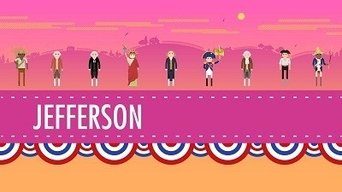
John Green teaches you about founding father and third president of the United States, Thomas Jefferson.

In which John Green teaches you where American politicians come from.
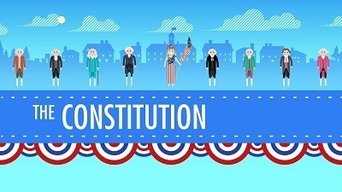
John Green teaches you about the United States Constitution. During and after the American Revolutionary War, the government of the new country operated under the Articles of Confederation. While these Articles got the young nation through its war with England, they weren't of much use when it came to running a country. So, the founding fathers decided try their hand at nation-building, and they created the Constitution of the United States, which you may remember as the one that says We The People at the top. John will tell you how the convention came together, some of the compromises that had to be made to pass this thing, and why it's very lucky that the framers installed a somewhat reasonable process for making changes to the thing. You'll learn about Shays' Rebellion, the Federalist Papers, the elite vs rabble dynamic of the houses of congress, and start to find out just what an anti-federalist is.

John Green teaches you about the American Revolution. And the Revolutionary War. I know we've labored the point here, but they weren't the same thing. In any case, John will teach you about the major battles of the war, and discuss the strategies on both sides.

John Green teaches you about the roots of the American Revolution. The Revolution did not start on July 4, 1776. The Revolutionary War didn't start on July 4 either. (as you remember, I'm sure, the Revolution and the Revolutionary War are not the same thing) The shooting started on April 19, 1775, at Lexington and/or Concord, MA. Or the shooting started with the Boston Massacre on March 5, 1770. At least we can pin down the Declaration of Independence to July 4, 1776. Except that most of the signers didn't sign until August 2. The point is that the beginning of the Revolution is very complex and hard to pin down. John will lead you through the bramble of taxes, royal decrees, acts of parliament, colonial responses, and various congresses.

John Green teaches you about the beginnings of the American Revolution in a video titled The Seven Years War. Confusing? Maybe. John argues that the Seven Years War, which is often called the French and Indian War in the US, laid a lot of the groundwork for the Revolution.
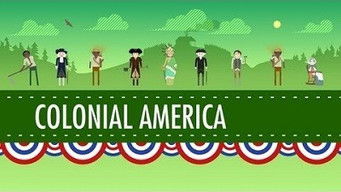
John Green teaches you about some of the colonies that were not in Virginia or Massachussetts. Old New York was once New Amsterdam. Why they changed it, I can say; ENGLISH people just liked it better that way, and when the English took New Amsterdam in 1643, that's just what they did.

John Green teaches you about relations between the early English colonists and the native people the encountered in the New World.
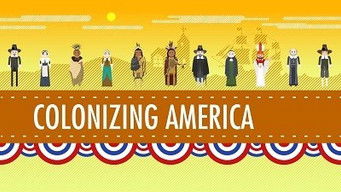
John Green teaches you about the (English) colonies in what is now the United States. He covers the first permanent English colony at Jamestown, Virginia, the various theocracies in Massachusetts, the feudal kingdom in Maryland, and even a bit about the spooky lost colony at Roanoke Island.

John talks about the Native Americans who lived in what is now the US prior to European contact. This is a history class, not archaeology, so we're mainly going to cover written history. That means we start with the first sustained European settlement in North America, and that means the Spanish. The Spanish have a long history with the natives of the Americas, and not all of it was positive. The Spanish were definitely not peaceful colonizers, but what colonizers are peaceful? Colonization pretty much always results in an antagonistic relationship with the locals. John teaches you about early Spanish explorers, settlements, and what happened when they didn't get along with the indigenous people. The story of their rocky relations has been called the Black Legend. Which is not a positive legend.
John Green teaches you the history of the United States of America in 47 episodes!
The tv show is currently not available onine

as Self - Host